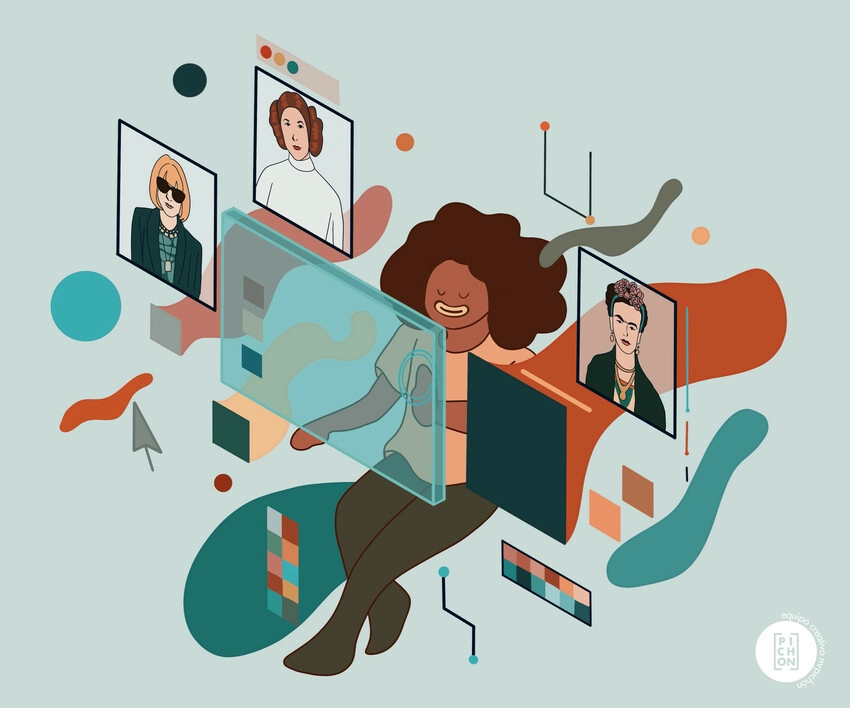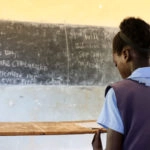Media Centre - 11 October 2021
On International Day of the Girl, new survey reveals 60% of Australian girls felt unrepresented among heroes and idols growing up – but COVID-19 and the digital age has made diverse role models far more accessible

A new survey and report has revealed that COVID-19 and the shift to living more of our lives online has led to girls and young people finding it easier to access empowering and diverse role models they identify with.
Released today on International Day of the Girl by Plan International Australia, the leading international charity for girls’ equality, the report shines a light on why diverse female representation matters – online, in the media, in the boardroom, on the sports field and beyond.
Represent Us! How diverse role models can transform girls’ lives found that the emergence of online spaces has been a game-changer for girls to find and connect with role models who reflect their own identities –particularly in the wake of COVID-19
One-in-three (33%) of the 525 Australian girls and young women aged 16 – 25 who took part in the survey said increased social media time due to COVID-19 has made it easier to find diverse and like-minded role models they identify with.
60% of respondents said they found it hard to find role models that reflected their diversities when growing up – and 23% of those said they had no role models to look up to whatsoever.
The survey underscores just how profound the lifelong impacts of supporting adolescent girls can be for tomorrow’s future women – from their career choices to their education and their self-belief. It found that if 66% of girls and young women had more role models of diverse cultural backgrounds, gender identities, or disabilities in the past, they believe it would have had an impact on their self-confidence. More than half said it would have improved their career choices (56%) and education (52%).
This is especially the case for LGBTIQ+ young women, with 82% saying more diversity in female role models would have had an impact on their self-confidence growing up – and 65% say this would have impacted on their career aspirations.
66% of those with a disability said seeing more diversity in role models and seeing themselves represented in the famous people they looked up to would have positively impacted on their self-confidence.
“Growing up as a hijabi, I didn’t see many hijabi representatives in the media and it made me feel insignificant because I thought people like me just didn’t have the same chance or opportunities as others,” said Shamsiya Hussainpour, a journalist and Plan International Australian youth activist.
“We connect with those whom we can see our own reflections in – when the reflection is not there, the connection isn’t either. This is why diversity in every field is important. It took me a lot of courage to pursue my career as a journalist so I can be a role model for many others like myself.”
The survey not only demonstrates why it is crucial for girls to see diverse leadership and representation, but also points to the ways women can be more visible and supportive role models for girls, younger women and gender-diverse youth.
Almost half of respondents said they would like to see female role models prioritise providing mentorship (49%), speak against discrimination (46%), and celebrate the achievements of diverse women (45%).
Young women who come from households where they speak a language other than English are especially keen to see female role models speaking out about discrimination (56%, compared to 42% of young women from an English-speaking background).
The survey also found that:
- 65% of young women say their role models can today be found in the arts.
- Young women also say female role models can be found on social media (59%), the media (57%), and in sports (54%).
- In contrast, only 29% of young women believe that there are female role models in politics. In fact, a majority of young women struggle to find any female role models in politics, with 36% claiming that there are ‘hardly any’, and one-in-four (26%) saying there are ‘none’.
“The old adage ‘you can’t be what you can’t see’ cannot be overstated. For girls and young women in all their diversities, the power of role models is in seeing themselves represented and knowing that they, too, can have a seat at the table,” said Plan International Australia CEO Susanne Legena.
“In our formative years, one of the ways we all get more confident and comfortable with our differences is through seeing those differences in our mentors, idols and heroes – the people who get our attention and take up media space.
“While workplaces are becoming more diverse, when it comes to diversity amongst the people in power and those with influence, we still have a long way to go.
Report launched by powerhouse women at event on IDG eve
The report was launched last night at an inspiring online event by Plan International Australia, the charity for girls’ equality, hosted by professional network Future Women and supported by Australian fashion brand Witchery to celebrate International Day of the Girl.
In 2011, the United Nations declared 11 October International Day of the Girl, following advocacy by Plan International, the world’s leading girls’ rights organisation. The day was born from a Plan International campaign to see girls on the global agenda, and recognises girls’ rights and the unique challenges that girls face around the world. The theme of this year’s day is ‘Digital generation. Our generation.’
Author, presenter and political commentator Jamilia Rizvi led a rich and empowering panel conversation between comedian and author Tanya Hennessey – a social media sensation with over one million Facebook followers – AFLW star player Akec Makur Chuot and the founder of MoneyGirl social enterprise Mariam Mohammed.
“When people from underrepresented communities see themselves reflected in a person with power – someone making decisions and with a seat at the table – the consequences of that are incredible. These trailblazers not only help inspire our dreams, they help us carve out a path to make those dreams a reality,” said Rizvi.
“I became disabled myself in 2018. The shock and transition to a new way of living, and a new body to live in, was severe. I believe it would have been easier had I had greater access to disabled role models as a child, she said.
Emphasising the AFL’s indigenous origins, Makur Chuot said that playing professional AFL football had changed her life and that she wanted to give all girls – especially those from diverse backgrounds – the self-belief that they too could follow their dreams. Makur Chuot is the first AFLW player of African descent to be drafted into the league.
“The more young African girls they see, the more Asian girls they see being represented on a level playing field normalises it. The more communities reflected in the AFL, the easier it becomes,” she added.
Social enterprise founder Mariam Mohammed, whose organisation MoneyGirl provides financial literacy to women, was named a finalist in last year’s NSW Young Women of the Year and was included in the Financial Review’s 100 Women of Influence. She said that until she saw Greens politician Mehreen Faruqi, she did not believe a brown, Muslim woman could make it in the Australian political system.
“And until I saw Antoinette Lattouff, I did not think women of colour could go into Australian television. Me – with all my privileges – felt that *I* did not belong. That’s the power of diverse and inclusive representation. It’s not a checkbox. It’s personal,” she said.
[ENDS]
About this survey
YouGov conducted this poll with a representative female online sample of 525 female Australian residents aged 16-25 in both city and regional areas between 17-24 September 2021. The effective sample size after weighting is 449, and the theoretical margin of error is ±4.6 percentage points. Due to rounding, totals for results may not add to 100.
Media contacts


